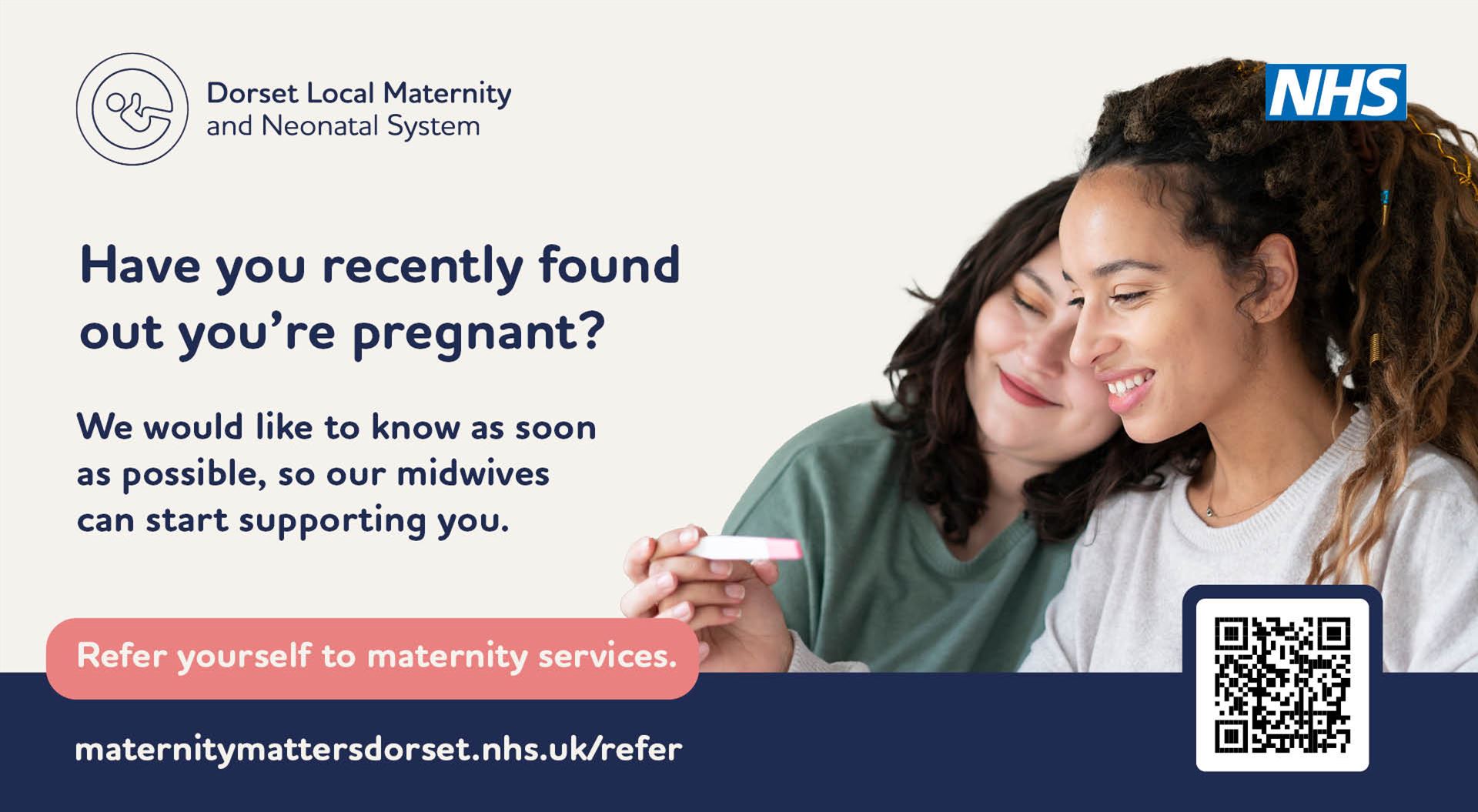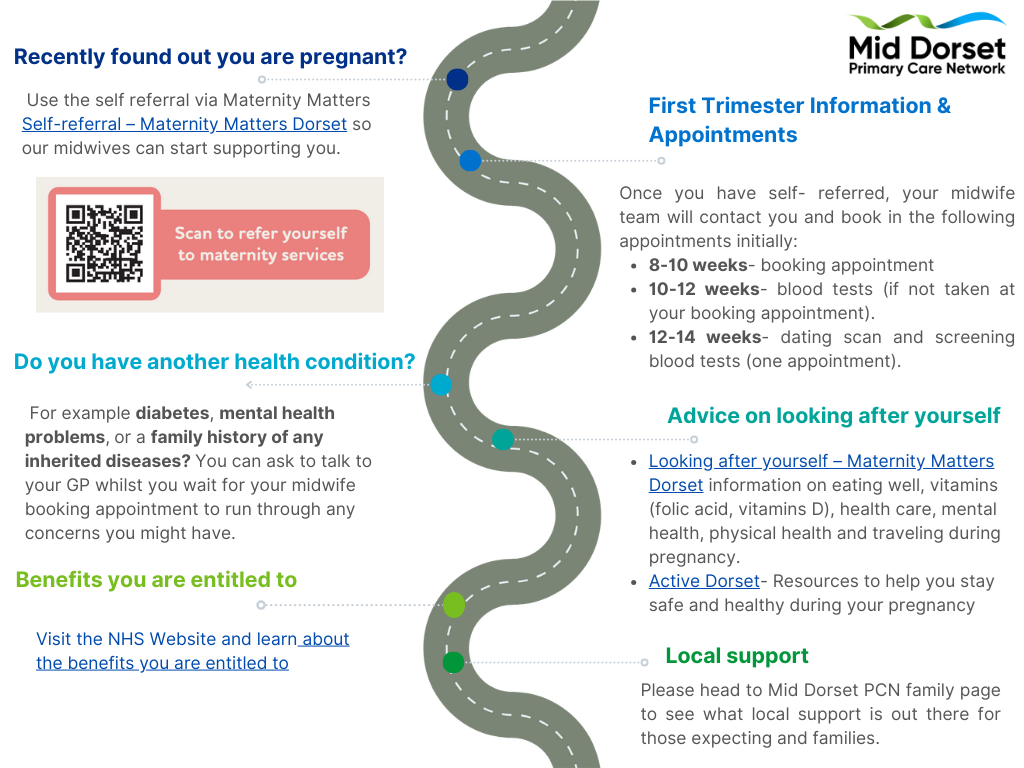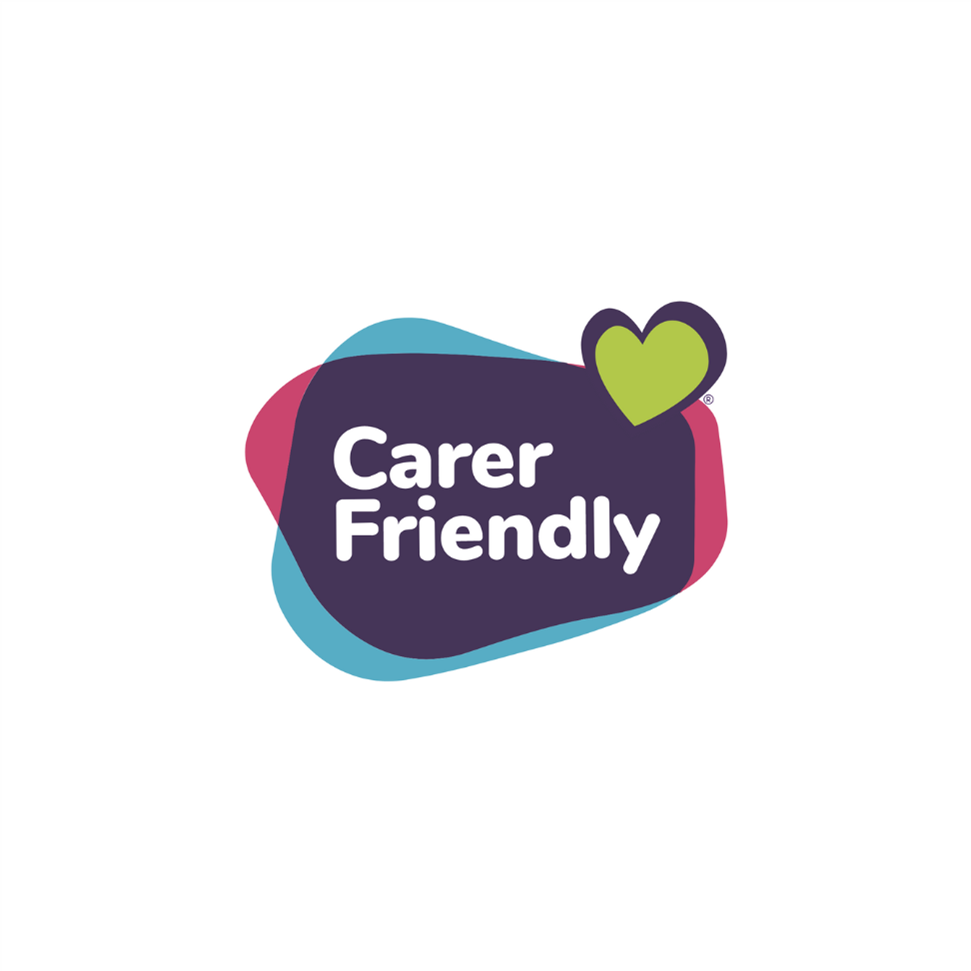Finding out your pregnant
Confirming your pregnancy
You can purchase pregnancy tests from lots of places, such as pharmacies and supermarkets. It’s best to wait until your period is late before you test to make sure you get an accurate result, but there are more sensitive tests available that will give you an answer a little earlier.
If you get a positive test, you don’t need to see your general practitioner (GP) to confirm it but the local midwives would like to know. Please self-refer yourself on the Maternity Matters webpage link here: Self-referral – Maternity Matters Dorset
If the test is negative, it’s best to wait a few days and then try again. If your period doesn’t start and your tests are still negative, please see your GP.

I am pregnant - what to do next?
Once your self-referral is complete, you’ll be contacted to schedule your first booking appointment, usually around 8-12 weeks pregnant, or sooner if your pregnancy is further along.
If you have any pre-existing conditions, such as Type 1 or Type 2 Diabetes, inform your GP as soon as you find out you're pregnant. This allows them to review your medication and provide any necessary care. If you do not have any pre-existing conditions, there’s no need to see your GP.
If you have concerns about your health or your baby’s health before your appointment, contact your GP or call 111.
Vitamins
It is essential to start taking Folic acid (400 micrograms) daily until you're 12 weeks pregnant (or as advised by your doctor). Ideally, start before conception or as soon as you find out you're pregnant, as it helps prevent neural tube defects like spina bifida.
Other vitamins like Vitamin D (10 micrograms daily), iron, Vitamin C, and calcium are also advisable to support a healthy pregnancy. Always consult your midwife or doctor for guidance - you can read more about vitamins further down this page.

Pregnancy roadmap
Vitamins
If you're taking vitamin supplements during pregnancy, make sure you're choosing the right ones. Avoid Vitamin A during pregnancy, so it's best to take vitamins specifically designed for this period.
Folic acid (400 micrograms) should be taken daily until you're 12 weeks pregnant (or as your doctor advises). It's ideal to start taking it before conception, but if not, begin as soon as you find out you're pregnant. Folic acid helps prevent neural tube defects like spina bifida.
Vitamin D (10 micrograms daily) is also essential during pregnancy and breastfeeding, as it helps maintain healthy bones, teeth, and muscles. Some women may need higher doses (25 micrograms) if they're at increased risk of low Vitamin D levels, especially related to coronavirus.
Other supplements to consider are iron, Vitamin C, and extra calcium, which can also benefit pregnancy.
Click on the link below to find out more
Vitamins-in-pregnancy.pdf (maternitymattersdorset.nhs.uk)
Vitamins, minerals and supplements in pregnancy - NHS (www.nhs.uk)
Looking after yourself in pregnancy
During your pregnancy there are lifestyle choices that can have a positive or negative impact on your pregnancy and birth journey. It’s important to consider how you can improve your health and keep your baby safer during pregnancy.
Click on the link below to find out more.
Things to think about
Vaccinations in pregnancy
Having the recommended vaccinations during pregnancy, and after your baby is born, is one of the most effective things that you can do to reduce the risk of vaccine preventable infections for you and your baby.
Click on the link below to find out more.
Benefits you are entitled to
Learn about the benefits you are entitled to on the NHS website Maternity and paternity benefits and leave - NHS (www.nhs.uk) including Maternity exemption certificates | NHSBSA - A maternity exemption certificate entitles you to free NHS prescriptions. You can also use the certificate as proof that you are entitled to free NHS dental treatment while you are pregnant. Find out if you're entitled to help with other health costs using the NHS eligibility checker.
Telling your employer
You must tell your employer that you are pregnant at least 15 weeks before your due date. By law, they must perform a risk assessment to ensure that it’s safe for you to continue your job throughout pregnancy. If any aspect of your job isn’t safe, your employer should make reasonable adjustments to your work environment, conditions and hours – find out more about reasonable adjustments in pregnancy.
If you are employed, you are entitled to:
-
Paid time off for antenatal appointments and scans
-
Maternity leave
-
Protection against discrimination / dismissal as a result of your pregnancy
-
Maternity Pay or Maternity Allowance
It can be difficult to decide when to stop working. It’s worth thinking about your specific job, the work environment, your commute, proximity to your chosen maternity unit (or home, if you want a homebirth) and how much physical strain is involved in your job. There is no right time to stop and everyone is different.
Page created: 17 June 2024
